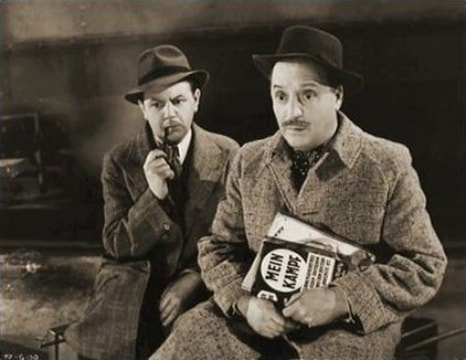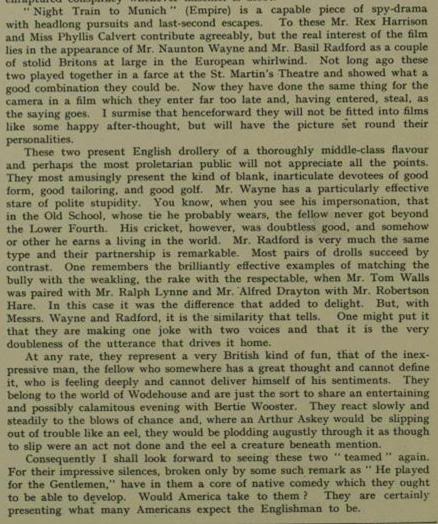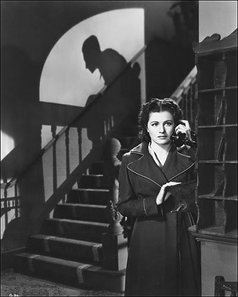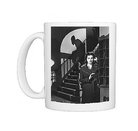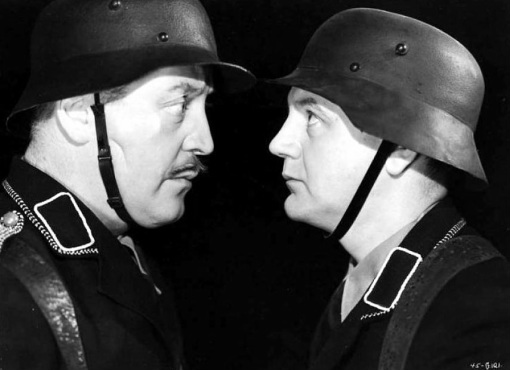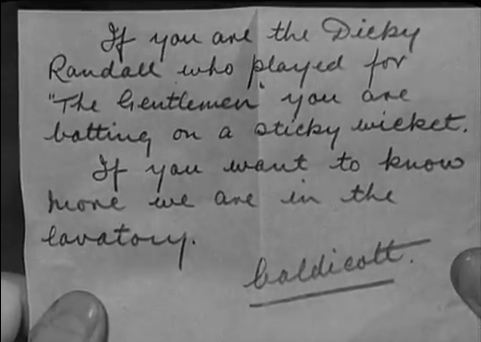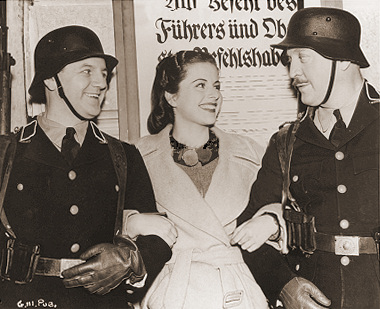Night Train to Munich
|
Charters and Caldicott are the leading characters in Carol Reed's Night Train to Munich . It twists and turns to create a cloak-and-dagger delight. The movie, written by Sidney Gilliat and Frank Launder (of The Lady Vanishes fame), combines comedy, romance, and thrills. Night Train to Munich takes viewers on a World War II journey across Europe, as Nazis pursue a Czech scientist and his daughter (Margaret Lockwood),. Charters and Caldicott, holidaying in Germany as war breaks, assist the debonair British undercover agent, Dicky Randall, as he rescues the scientist and his daughter from the clutches of their German captors. It is fast moving, witty and has some of the best comedy characters written into a thrilling suspense movie.
|
|
Night Train to Munich is set at the start of the Second World War just as Britain declares war on Germany. This comedy thriller sees Charters and Caldicott bravely coming to the rescue of Rex Harrison's and Margaret Lockwood's characters
Charter and Caldicott quotes “I bought a copy of Mein Kempf. You never know, it might shed a spot of light on all this ‘how do you do". “A waste of time all this bilge in the passport” “We shall write to the company about this. You are not at war with England yet you know.” “Why don’t you try the thingamabob” “Fat bellies!”' “Safe jobs!” "If you want to know more, we are in the lavatory. " 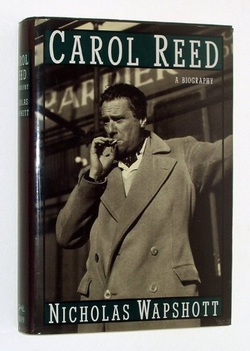
Extract from Carol Reed: A Biography by Nicholas Wapshot published by Alfred A. Knopf 1994
As he waited to start work in earnest on the Young Mr Pitt, Reed received some good news from the US. Despite the initial coolness of the American Distributors to Night Train and its unpromising release in New York, the film had slowly taken off. Suddenly on both American coasts, in New York and Los Angeles, the small theatres which were showing Night Train found that they were attracting celebrities. Hedda Hopper, the influential Hollywood gossip columnist, wrote "At a neighborhood theater where it was showing the other night i saw six of our prominent directors and Bing Crosby, Spencer Tracy, Walter Pidgeon and Claudette Colbert in the audience. You know this is the picture of which Winston Churchill asked to have a special showing. If you miss it, don't say". Marlene Dietrich, Joe Pasternak and Alfred Hitchcock also went to see it. And Walter Winchell, one of America's most widely synicated columnists, described the film as "a dazzler. The ice it puts on your spine is brand new." Click on the picture above to buy the book from Amazon Set of Night Train To Munich Film Posters Foreign Film Posters DVD and Video Covers |
Directed by Carol Reed Writing Credits ; Sidney Gilliat and Frank Launder. Based on the original story “Report on a Fugitive”, by Gordon Wellesley Production Company, Twentieth Century Productions Ltd 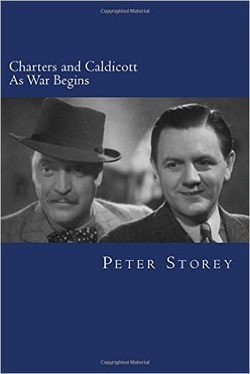
Charters and Caldicott - As War Begins Charters and Caldicott - As War Begins covers the period in Charters’ and Caldicott’s screen life between 1938 and 1943 covering their first four film appearances - The Lady Vanishes, Night Train To Munich, Crook’s Tour and Millions Like Us - all classic films. This book brings together - for the very first time - all the scenes that they appeared in - telling the story of what Charters and Caldicott saw, what they said and what they understood to be happening. It tells the humorous way that Charters and Caldicott saw the world and the funny and exciting adventures that happened to them during this very turbulent time in world history. To purchase the book, click on the link below Cast Charters Basil Radford Caldicott Naunton Wayne Anna Bomasch Margaret Lockwood Gus Bennett Rex Harrison Karl Marsen Paul Henreid Axel Bomasch James Harcourt Dr. Fredericks Felix Aylmer Dryton Wyndham Goldie Roberts Roland Culver Schwab Eliot Makeham Kampenfeldt Raymond Huntley Capt. Prada Austin Trevor Controller Kenneth Kent Admiral Hassinger C.V. France Gestapo Officer Frederick Valk Teleferic Attendant Morland Graham Minor Role Edward Baxter Minor Role Jane Cobb Deckchair Attendant Arthur Denton Official at Home Office, MI5 Ian Fleming Station Master Irene Handl Inspector on Train Bryan Herbert Himself (archive footage) Adolf Hitler Official at Prague Steel Works David Horne Prisoner in Concentration Camp Allan Jeayes Concentration Camp Guard Albert Lieven SS Officer Checking Passes Howard Marion-Crawford Minor Role G.H. Mulcaster SS Officer - Concentration Camp Charles Oliver Minor Role Winifred Oughton Fisherman Wally Patch Minor Role J.H. Roberts Adolf Hitler Billy Russell Minor Role Torin Thatcher Official at Prague Steel Works Wilfred Walter Official at Prague Steel Works David Horne Concentration Camp Physician John Wengraf Train Steward Ben Williams Minor Role Pat Williams Minor Role Pardoe Woodman Ticket Collector Fletcher Lightfoot Train Passenger Phillip John Becker Crew Producer Edward Black Music Louis Levy & Charles Williams (both uncredited) Cinematography Otto Kanturek (photography) Film Editing R.E. Dearing Art Direction Alex Vetchinsky Production Management Maurice Ostrer in charge of production Assistant Director Roy Ward Baker second unit director (uncredited) Douglas Peirce assistant director (uncredited) Art Department Maurice Carter assistant art director (uncredited) Sound Department B.C. Sewell sound supervisor Sydney Wiles recording Camera Department Davis Boulton still photographer (uncredited) Costume Department Eugene Joseff costume jeweller (uncredited) Music Department Louis Levy musical director Other crew Michael Gordon cutting Leslie Frewin publicist (uncredited) Jo Harcourt continuity (uncredited) Night Train to Munich trivia Night Train to Munich, whilst successful, was never expected to be so successful by the production team. Originally titled ‘Gestapo’, Carol Reed considered the original script and plot ‘rather serious’ and felt it ‘wrong to make something so heavy at such a time, so made it more amusing’. The interplay between Rex Harrison and Margaret Lockwood deliberately echos that of Michael Redgrave and the actress in The Lady Vanishes. Charters and Caldicott being on hand to help out when needed adds to the ‘prequel’ effect of Night Train To Munich. But this is something more than a pale copy. It is deliberately light-hearted but it has an edge of urgency and anxiety that wasn’t present in The Lady vanishes; perhaps an acknowledgement that the enemy being fought was ruthless and well organised. Shortage of good news in the early years of the war meant that film makers had to fall back on spy thrillers to entertain cinema-goers – Night Train to Munich is a classic example. Night Train to Munich was one of the first British films to depict resistance activity in Europe by showing the Bomasch’s not wanting to be part of the German war machine and their attempts to get to safety in Britain. The American government originally refused to allow the film to be released in the USA until it was drastically cut in order to avoid giving the impression that England was overrun by traitors. It was a Ministry of Information honorary advisor, Sidney Bernstein, who agreed to the cut, much to the annoyance of the production team. |
